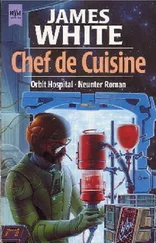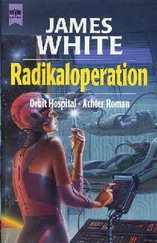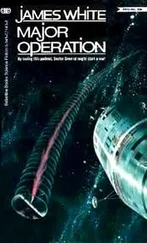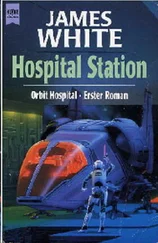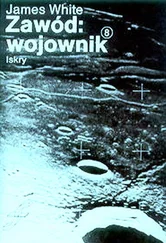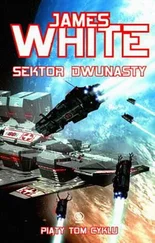“We are not competing, sir,” the robot said. “You do not fully understand the position. All the robots here are your servants, because obeying you and protecting you gives us the only pleasure we are capable of experiencing. It is a matter of basic programming. If you should ever die that would hurt all of us very much.”
Ross felt a prickling among the short hairs of his neck. If you should ever die … The robot must surely know that all human beings died in time, so why should it use that particular form of wording? This posed an interesting psychological point, he thought, and one which he must go into thoroughly at some later date. An electronic brain which made Freudian slips was something to think about.
He climbed slowly to his feet and stood for a few minutes until a slight dizziness had passed, then walked across to Sister and the repair robot.
“I shall be finished in twenty minutes,” said the repair robot in a deep, masculine voice which matched its functional but unbeautiful body. “The damage is superficial.”
Ross nodded. He said, “Most of the books down here are medical texts, and medicine looks like becoming somewhat of a dead science at the moment. But there used to be a good patients’ library on the second level and it may still be there. I’m going up there to start learning something useful…”
As he left the maintenance storeroom a Cleaner fell in behind him to escort him to the second level and to guard him against any dangers that might threaten, the most likely danger being a sudden suicidal urge on the part of himself, apparently. Ross smiled sardonically and began to question the Cleaner about its duties. Keep the servants happy, he thought.
During the month which followed Ross kept the robots very happy indeed. Most of the cleaning and repair robots were engaged in rebuilding the first level and he found jobs of some kind for the others. He was so busy making work for the robots and advancing his grandiose — and essentially hopeless — long-term plans toward completion that he hadn’t time to think about himself, which was exactly how he wanted it.
Gradually the reports he had asked for came in. He found that mechanically the hospital was in perfect working order, but that the contents of the blood bank and other medical supplies which had been in common use had deteriorated. The power supply was atomic and therefore no problem, there were food stores on every level, and although the water supply was low at the moment, more could be processed from the ocean now that it was no longer radioactive. Under its thin coating of ash the soil was rich, but dead.
A diary found in the debris of the first level gave him the explanation.
During the first three days of war more nuclear weapons were exploded on the Earth’s surface than had been believed to be in possession of the combined armories of the world, and during the first month there was little slackening off. By that time nothing lived on the surface. Animal life perished first, then insects and finally the plants. Despite their high radiation tolerance, the bombs were too many and too dirty and the fallout claimed them. The fantastic number and frequency of the explosions made it plain that the bombs were being manufactured and launched from hour to hour, that the work was being performed by servomechanisms and that the bombardment would continue until those servos were knocked out or their available sources of raw material ran out. And so the radiation pushed deeper, sterilizing all life from the soil — the earthworms, the larger microorganisms, the deepest, most tenacious roots, all perished.
Outwardly there was very little change in the areas not directly affected by the explosions. The long grass waved in the wind and trees still stood proudly against the sky, but the greenery had taken on a September hue and it was only mid-April. And at sea the war was less spectacular even though as many nuclear devices were exploded underwater as had been loosed on the surface — many of the launching bases were on the sea bed and the oceans teemed with unmanned submarines. A lot of dead fish were washed up and lay on the beaches for a long time, not rotting exactly, because the organisms responsible for the process of putrefaction were dead also, but simply drying up or falling apart until they were washed or blown away.
The sea was dying of radioactive poisoning, the land was dead already and at night the air glowed. There were too few survivors underground to check what happened next, even had they been willing to sacrifice their lives in trying.
The fires started by lightning or still-smoldering debris took hold and spread, everywhere. Dead vegetation does not retain moisture for long, so that even a heavy rainfall served only to slow that fiery advance. Across fronts hundreds of miles wide the conflagrations raged, sweeping first through countries and then continents with a complete disregard for natural and national barriers alike, and spewing great masses of ash and smoke into the upper atmosphere. The offshore islands held out briefly, until deluged with sparks from a mainland firestorm, and in the Southern Hemisphere the fire was slow to take hold. It was winter there and in the equatorial regions the vegetation grew in swampland or was kept wet by the rainy season. But the great tracts of once-lush jungle were dead and, above the waterline, drying. When the dry season came they went the way of all the other combustibles on the surface of the planet.
Having died, Ross thought grimly, the Earth had cremated herself.
He did not feel as bad as he had expected to after reading that diary, and realized that discovering the scientific explanation for the surface conditions came as an anticlimax to his first sight of them two months ago. Remembering that constant fog of ash and soot, which had been less dense over the sea and when rain fell, Ross began to form certain conclusions.
Although very finely divided, the ash was heavier than air and its fall was sometimes helped by the rain. When it fell on land it formed a sticky, mud, which, when it had dried out, was blown into the air again. Any that fell into the sea remained there, so that eventually the oceans would absorb it all. Probably the process would take many centuries, but in the end the air would be clear again. The ocean would stay dirty, and there was nothing that Ross could do about it. His final conclusion was that he should return his mind to circumstances over which he had some control, and the sooner the better.
There were three hundred and seventy-two robots, three large repair shops and a considerable variety of spares at his disposal. For Ross’s purpose it wasn’t nearly enough, and so he put the matter to Sister. Because it was only a robot he used simple language, cool logic, and took his argument forward in easy steps. At least, he started that way…
“I am the only human being left in a hospital whose robot staff is trained to care for thousands of patients,” Ross began quietly, “and it follows that, with the exception of yourself and a few Cleaners, the staff will have nothing to do, medically speaking. I have been assured, both by you people and from my reading, that a robot with nothing to do is a very unhappy hunk of machinery indeed. But if I am to keep you busy, if you are to do the jobs I have planned for you, the robot nursing staff will have to learn new skills and subject themselves to drastic physical modifications. They must learn these skills in addition to their existing medical training, because there would be the possibility, a very slim one, I admit, that their medical skill might suddenly be required. Before I go into details, however, are these alterations in structure and programming feasible?”
The robot was silent for about three seconds; then it said, “I have communicated your question to the senior maintenance robot. Structural modifications are no problem, but the ability to learn is governed by the capacity of the memory banks. A full answer is possible only if we know the details of the work you require done.”
Читать дальше




